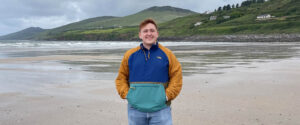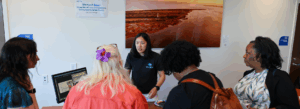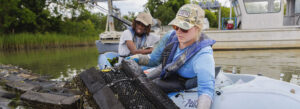Mid-Atlantic oil spill workshop bridges gap between responders, researchers, and community
Among oil spill responders, the saying goes: you don’t want to be strangers at a spill response. To connect groups involved in oil spill responses and improve response efforts for future spills, the Oil Spill Science Outreach Team and Virginia Sea Grant coordinated a mid-Atlantic oil spill workshop.
The workshop was one of a series of five workshops held to determine the needs of different coastal regions. At the mid-Atlantic workshop, 74 attendees from North Carolina up to Delaware represented aquaculture, tourism, public health, emergency response, academia, disaster research, and affected communities.
Even though there’s no offshore oil drilling in the mid-Atlantic, spills can still occur from fuel and oil being transported in tankers or stored in sensitive coastal areas. These spills have serious consequences for the region’s unique coasts and the aquaculture, fishing, and tourism that depend on them.
Oil, the environment, and public health
No two oil spills are alike, so each response is tailored specifically to each spill.
For example, a California spill near the entrance of Humboldt Bay released about 2,000 gallons of fuel oil—a relatively small spill—onto shore during molting season for Marbled Murrelet birds. Oil strips the birds’ protective coating that keeps them warm and buoyant, and trained responders helped clean the birds. Even though a relatively small number of Marbled Murrelets died in the spill, that had a big impact on this threatened species.
But in the Lynnhaven River of Virginia, known for its aquaculture, circumstances worked in favor of responders during a 2017 spill in Wolfsnare Creek. Responders contained as much of the 94,000 gallons of jet fuel as they could by using absorbent barriers called booms. The high tide meant that oil only touched the tips of the marshes, and the plants were partially spared when the remaining oil washed out with the tide.
The type of oil spilled also matters. Crude oil can persist for years and can be difficult to clean up, but it’s less toxic than the refined oils used to fuel boats and jets. Fuel oils, while highly toxic, will evaporate more quickly, making their removal easier.
“We have been spilling oil in various volumes for over a century now, but surprisingly, we don’t actually have very many studies on the human health effects of oil spills,” said Amy Hayes, a of the Virginia Department of Health. “It’s hard to track down any small health effects, unless you have a really large population to study. In most cases, the people who are going to be directly exposed to a spill are [a small group of] people doing the cleanup.”
Environmental and human health priorities identified at the workshop included the study of regional traffic patterns for vessels and evaluating preparedness for biologically unique coasts like those on Virginia’s Eastern Shore. Establishing liaisons between communities, fishers, and the national spill response team would keep shellfish growers in the loop about seafood safety, or when to shut off water uptake valves for farms. Clear and frequent communication can help lessen the impacts of a spill.
“The biggest thing is, again, knowing our partners,” said Ann Hayward Walker of SEA Consulting Group. “And—within our whole area—who we start contacting, knowing how long it’s going to take us to get up to that area specifically.”
Oil spills, community wellbeing, and communication
Dollar signs aside, oil spills can have social impacts for communities, too. Short term stress comes from the uncertainty that can occur after a spill.
“We had double-hulled tankers, we had response plans, we had some kind of control over these events, but in fact, what we experience afterwards is the notion that people lost control,” said Liesel Ritchie, Associate Director of the Center for the Study of Disasters and Extreme Events at Oklahoma State University.
In Ritchie’s experience, a lack of closure and sense of disruption can linger long after the oil spill has been cleaned up. The claims and litigation process can cause as much stress as the spills themselves. Providing the right information through the right channels can help alleviate the community’s stress.
Proper planning requires that locals are involved throughout the whole process—and that response professionals provide as much relevant information as possible before spills happen. Many local communities aren’t aware that response plans are already in place because of legislation like the Oil Pollution Act.
Coastal regions regularly hold open meetings to review response plans and prepare, but oil spills aren’t a hot topic for many mid-Atlantic communities. Federal and state coordinators can also enhance their planning by including local knowledge in their response preparations. Local involvement can also make response efforts more efficient.
“I’m a local who learned all this on the fly,” said Erin Sutton, who responded to a 2017 fuel spill as the deputy emergency services coordinator for the City of Virginia Beach. “We had USDA, we had the Department of Game and Inland Fisheries—we had the alphabet soup—and I had no idea what anybody did, and I was the local on-scene coordinator.”
Preventing responders and local representatives from being strangers at the scene of a response requires communication, and the mid-Atlantic workshop was a step in the right direction of turning the old adage on its head.
“Communication is a big point of interest in all of the regions,” said Chris Hale, an oil spill science specialist with Texas Sea Grant and one of the lead coordinators for the workshops. “It seemed like there were a lot of great discussions, and people were engaged at the workshop.”
Even though there’s no offshore oil drilling in the mid-Atlantic, spills can still occur from fuel and oil being transported in tankers or stored in sensitive coastal areas.
The mid-Atlantic oil spill workshop produced regional priorities for oil spill research, outreach, and protocol improvement.
Oil and economies
Dark patches of oil washing up on a beach are hard to miss, but the biggest impacts of a spill aren’t always as striking or immediate. Often, economic damages come from what’s missing—the tourists absent from local beaches, restaurants, and hotels. Sandy beaches recover much faster than sensitive wetlands, but habitat isn’t the only resource at stake.
“You have a dollar that’s not being spent at a hotel, or at a restaurant, but then there are subsidiary effects that go through the economy,” said Ted Tomasi, the vice president and global senior principal at Cardno. “Our institutions are much better at addressing the direct effects, and maybe some of these indirect effects are left behind.”
Property values for homeowners recover fairly quickly after oil spills, according to Tomasi. But in order for businesses to file a compensation claim, they first must document normal economic circumstances for comparison.
“Are your communities collecting data on human use?” Tomasi asked. “Do they have traffic counters at beaches? Are they collecting money and making sure they know that there was one person in the car or five people in a car? Are they collecting data on parking receipts?”
Economic recommendations included improving baseline business information, assisting locals with filing claims, and spreading information about the claims process before spills occur.
The workshops were supported by the National Academies of Science-Gulf Research Program, the Gulf of Mexico Research Initiative, and the Gulf of Mexico Sea Grant Oil Spill Science Outreach Program. A national report based on the regional priorities will be published in September. The reports identify research priorities to assist funders in creating opportunities that respond to regional and national needs.
View the workshop report here. For more information on the Virginia Area Committee’s quarterly meetings, please contact LT Steve Arguelles, US Coast Guard, at steve.j.arguelles@uscg.mil.
Takeaways:
- The mid-Atlantic oil spill workshop produced regional priorities for oil spill research, outreach, and protocol improvement.
- The workshop covered three main areas: the health, economy, and wellbeing of communities in the face of a potential oil spill.
- The workshop improved communication between different groups affected by an oil spill and identified potential pilot projects that research funders could prioritize.
Photos and video by Aileen Devlin | Virginia Sea Grant
Contributed photo provided by NOAA and the Georgia Department of Natural Resources.
Story by Madeleine Jepsen | Virginia Sea Grant
Published June 26, 2019.
Preventing responders and local representatives from being strangers at the scene of a response requires communication, and the Mid-Atlantic workshop was a step in the right direction of turning the old adage on its head.





